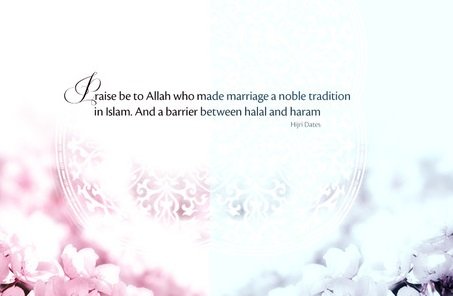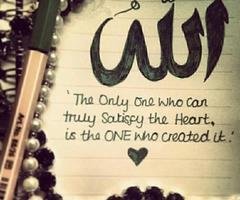-
Posts
8,462 -
Joined
-
Days Won
773
Content Type
Profiles
Forums
Events
Everything posted by ummtaalib
-
Tests by Allah سبحانه و تعالى By Ebrahim Saifuddin Allah سبحانه و تعالى has tested the people of the past in various ways and will keep on testing His creation. He has informed us about these tests in the Quran. Our beloved Prophet Muhammad ﷺ also informed us that Allah سبحانه و تعالى will test us from time to time. Sometimes hardships and losses occur in life due to our sins. To wash of these sins in this world, Allah سبحانه و تعالى inflicts upon us these hardships: Narrated by 'Ayesha: Allah’s Apostle ﷺ said, “No calamity befalls a Muslim but that Allah expiates some of his sins because of it, even though it were the prick he receives from a thorn.” (Sahih Bukhari Vol. 7, Book 70, #544) And again by a different narrator: Narrated by Abu Said Al-Khudri and Abu Huraira: The Prophet ﷺ said, “No fatigue, nor disease, nor sorrow, nor sadness, nor hurt, nor distress befalls a Muslim, even if it were the prick he receives from a thorn, but that Allah expiates some of his sins for that.” (Sahih Bukhari Vol. 7, Book 70, #545) Paying for sins in this world is much easier than paying in the Hereafter. It is a blessing in disguise which Allah سبحانه و تعالى bestows upon us and saves us from the payment of these sins in the Hereafter. The Quran informs us what to do when we face these tests in our life and also tells us about the reward that we will receive if we are successful in dealing with the situation in the way we are expected to: Be sure we shall test you with something of fear and hunger, some loss in goods or lives or the fruits (of your toil), but give glad tidings to those who patiently persevere, Who say, when afflicted with calamity: “To Allah We belong, and to Him is our return”:- They are those on whom (Descend) blessings from Allah, and Mercy, and they are the ones that receive guidance. – [Quran 2:155-157] We are to be patient during hard times and always remember that Allah سبحانه و تعالى is the Creator of everything and We all will return to Him. No deed is lost in front of Allah and we will be rewarded for even the minutest good that we ever did do. Trials afflicting us can be signs of His Love. It is narrated that Prophet Muhammad ﷺ said: Narrated By Abu Huraira: Allah’s Apostle ﷺ said, “If Allah wants to do good to somebody, He afflicts him with trials.” (Sahih Bukhari Vol. 7, Book 70, #548) Misfortune can bring a person towards the right path. It can make better Muslims out of people. Observing patience, remembering Allah سبحانه و تعالى and turning only to Him for help and guidance during such times, will help us attain Allah’s forgiveness and His rewards. Allah سبحانه و تعالى tests man through various agencies, both through adversity and prosperity. A person with a luxurious life is tested to see how much he spends in the way of Allah سبحانه و تعالى and how much he is thankful to Allah سبحانه و تعالى for the blessings bestowed upon him. Another can be tested by the things he desires but does not and/or cannot possess. What do these people do is actually their test. Does the person deviate from the way of Allah سبحانه و تعالى to pursue the worldly gains? Every soul shall have a taste of death: and We test you by evil and by good by way of trial. To Us must ye return. [Quran 21:35] The Quran reminds us that in periods of hardships, we are to remain patient, remember Allah, and protect ourselves from committing that which is declared unlawful by Allah سبحانه و تعالى: Ye shall certainly be tried and tested in your possessions and in your personal selves; and ye shall certainly Hear much that will grieve you, from those who received the Book before you and from those who worship many gods. But if ye persevere patiently, and guard against evil,-then that will be a determining factor in all affairs. – [Quran 3:186] An important thing that we should always remember is that everyone is tested. If we declare that we are Muslims, that does not mean that we will not be tested in this world. The Quran is very clear on this issue: Do men think that they will be left alone on saying, “We believe”, and that they will not be tested? – [Quran 29:2] One should not think or feel that he is the only unique person going through such times or that Allah سبحانه و تعالى is displeased with him. Every single person faces difficulties to the best of their capacity. Surely Allah is not unjust and does not over burden a soul: On no soul doth Allah Place a burden greater than it can bear – [Quran 2:286] This world is an abode for tests and one should not deny or avoid these but should face them and pass them successfully. A person can be put into hardships for a number of reasons and we might not know those reasons when undergoing a certain loss but what we must do is always remember Allah سبحانه و تعالى, be patient, abstain from what is unlawful, give charity and ask Him to help ease out our hard times. If we do fail to do this then we should turn to Allah سبحانه و تعالى and ask for forgiveness. Allah سبحانه و تعالى is Most Merciful and InshaAllah He will forgive us for the wrong that we do.
-
Writes dr76 sahib..... From the Mashaikh this useless fellow visited in the past.. i have heard them stress a lot on two things.. 1.Ikhlaas 2.Niyyat A Shaikh of my town, someone very close to me since 1993 - Hazrat Dr. Ali Malpa sahab damat barakatuhum ( khalifa of Hazrat Maulana Shah Wasiullah sahab ilahabadi And Hazrat Maulana Shah Abrar ul Haq sahab Hardoi .) would advise me many times on the lofty benefits of Ikhlaas and rectifying Niyyat.. Once while in Madina Munawwara in the service of Hazrat Rasul Ahmed sahab db ( a very old founding Tableeghi elder of the blessed city) on seeking permission to depart I requested Hazrat to make dua for ikhlaas.. He said, Ikhlaas Allah ke khazanon me se ek azeem daulat hai.. aur Allah use deta hai jo uske raaste me qurbaniyan deta hai.. (Ikhlaas is a great wealth from the treasures of Allah سبحانه وتعالى He bestows it upon those who give sacrifices in his path..) While in a suburb of Darbhanga (Bihar, India) in the Presence of an eminent Naqshbandi Mujaddidi Shaikh, Hazrat Maulana Shams ul Huda sahab db , I asked Hazrat to make dua for Ikhlaas.. Hazrat replied.. beshak.. Ikhlaas ek bahot badi nemat hai.. lakhon me kisi ek ko hasil hoti hai.. (surely.. Ikhlaas is a great bounty from Allah سبحانه وتعالى , only one in lakhs may have attained it..) And the words of Hazrat Maulana Ahmed Ali lahori sahab seems like written in gold.. Sabhi to hain usi ke.. par uska koee ek.. Hazaron me na milega ..laakhon me tu dekh.. Everyone belongs to him alone.. but he loves the one amongst.. In thousands u may not find him.. behold him among the lakhs.. dr76 sahib then begins the translation of the a Majlis where Hazrat spoke on Ikhlaas and its rewards in Wasiyatul irfan that was Published from the Khankah of Hazrat Maulana Shah Wasiullah sahab Read HERE...
-

On The Love of Allah & How to Acquire it
ummtaalib replied to ummtaalib's topic in Matters of the Heart
The Greatest Means of Attaining Allah's Love for us Following the Sunnah of the beloved of Allah sallallaahu 'alayhi wasallam "Say, [O Muhammad عليه الصلاة و السلام], if you (really) love Allaah then follow me. Allaah will love you and forgive you of your sins. And Allaah is Oft-Forgiving, Most Merciful." (Soorah Aali 'Imraan, 3:31) Ibn-Kathir (r.a) said in his Tafsir: “Allah’s (s.w.t) love is attained by following the Messenger sallallaahu 'alayhi wasallam. This honourable Ayah judges against those who claim to love Allah yet do not follow the way of Mohammad sallallaahu 'alayhiw asallam and his religion in all his statements, actions and conditions.” Tafsir 2/145 Optional Worship Abu Huraira (may Allah be pleased with him) narrated that Allah’s Messenger (peace and blessings of Allah be upon him) said that Allah said: “I will declare war against him who shows hostility to a pious worshipper of mine. And the most beloved things with which My slave comes nearer to Me, is what I have enjoined upon him; and My worshipper keeps on coming close to Me through performing Nawafil (praying or doing extra deeds besides what is obligatory) till I love him, then I become his sense of hearing with which he hears, and his sense of sight with which he sees, and his hands with which he grips, and his legs with which he walks; and if he asks Me, I will give him, and if he asks My protection (refuge), I will protect him.” [Al-Bukhari]. Tests "The greatest reward comes from the greatest trial. When Allaah loves people, He tests them, and whoever accepts it gains the pleasure of Allaah and whoever complains earns His wrath. [Tirmidhi] Loving, Visiting & Helping one another for His sake "My love is guaranteed for two who love one another for My sake; My love is guaranteed for two who visit one another for My sake; My love is guaranteed for two who help one another for My sake; My love is guaranteed to for two who uphold ties with one another for My sake." [Ahmad] Being Humble towards Believers & Stern towards Disbelievers "O you who believe! Whoever from among you turns back from his religion (Islam), Allaah will bring a people whom He will love and they will love Him; humble towards the believers, stern towards the disbelievers, fighting in the way of Allaah, and never fear of the blame of the blamers." [al-Maa'idah 5:54] -

On The Love of Allah & How to Acquire it
ummtaalib replied to ummtaalib's topic in Matters of the Heart
-

On The Love of Allah & How to Acquire it
ummtaalib replied to ummtaalib's topic in Matters of the Heart
اللَّهُمَ ارْزُقْنِىْ حُبَّكَ وَ حُبَّ مَنْ يَّنْفَعَنِىْ حُبُّهُ عِنْدَكَ Allahummar-zuqnee hubbaka wa hubba mayyan-fa'anee hubbuhu 'indaka O Allah! Grant me Your Love, and the love of that person whose love would benefit me in Your presence. -

On The Love of Allah & How to Acquire it
ummtaalib replied to ummtaalib's topic in Matters of the Heart
وعن أبي الدرداء، رضي الله عنه ،قال: رسول الله صلى الله عليه وسلم: : 'كان من دعاء داود عليه السلام ،"اللهم إني أسألك حبك، وحب من يحبك، والعمل الذي يبلغني حبك 'اللهم اجعل حبك أحب إليّ من نفسي، وأهلي، ومن الماء البارد". رواه الترمذي وقال حديث حسن. The prophet sallallaahu 'alayhi wasallam said, 'One of Prophet Dawud's supplications was: Allahumma inni as'aluka Hubbaka, wa Hubba man yuHibbuka, wal-'amalalladhi yuballighuni Hubbaka. Allahumm-aj'al Hubbaka ahabba ilayya min nafsi, wa ahli, wa minal-ma'il-baridi. ' O Allah! I ask You [to grant me] Your Love, the love of those who love You, and deeds which will cause me to earn Your Love. O Allah! Make Your Love dearer to me than [the love of] myself, my family and the cold water [winter]. - At-Tirmidhi. -

On The Love of Allah & How to Acquire it
ummtaalib replied to ummtaalib's topic in Matters of the Heart
-

On The Love of Allah & How to Acquire it
ummtaalib replied to ummtaalib's topic in Matters of the Heart
Acquiring the Love of Allah Shaykh Muhammad Saleem Dhorat (Hafizahullah) "The key to acquiring the love of Allāh ta'ala is: 1. Adopting the company of the pious (especially one's shaykh). 2. Abstaining from sins. 3. Being punctual with one's ma'mūlāt (prescribed practices). When someone enters the company of his shaykh, his heart is kindled with the Love of Allāh . However, when he leaves that blessed company, the flame of love is threatened by the gusting winds of the environment around him. If, affected by these winds, a person were to commit a sin, the love of Allāh ta'ala would be extinguished. It is therefore necessary to safeguard yourself from sins. Another necessity for keeping the flame of love kindled is fuel, which in this case is the remembrance of Allāh ta'ala prescribed by one's shaykh in the form of ma'mūlāt. Thus, punctuality in attending the company of one's shaykh, abstinence from sins and completing one's ma'mūlāt are necessary steps towards securing the Love of Allāh." Posted on www.shaykh.org Sunday, March 20, 2011 -

On The Love of Allah & How to Acquire it
ummtaalib replied to ummtaalib's topic in Matters of the Heart
10 Ways of Developing Love for Allah Adapted from Shaykh Ibn Qayyim's (rah) Madarij-us-Saalikeen Shaykh Ibn al-Qayyim (rah) says: 'The reason which cause mahabbah (love) of Allaah to develop, are ten: First: Reciting the Qur'aan, reflecting and understanding its meaning and its intent. Second: Drawing closer to Allaah 'the Most High' through optional deeds, after fulfilling the obligatory duties. Third: Being continuous in the dhikr (remembrance) of Allaah, with the tongue, the heart and the limbs' under all circumstances. The more continuant the dhikr, the more muhabbah develops and intensifies. Fourth: Giving precedence to what Allaah loves over personal loves, when being overcome by desires. Fifth: Contemplating and deliberating over the Names and Attributes of Allaah. Sixth: Recognizing and remembering the favors and bounties of Allaah both manifest and hidden. Seventh: To be humble and submissive before Allaah and this is the greatest matter. Eighth: To be in seclusion reciting the Qur'aan, during that time in which Allaah descends to the lowest heaven (which is the last third of every night), finishing this recitation with seeking Allaah's forgiveness and repenting to Him. Ninth: To sit in the gatherings of the true and sincere lovers of Allaah, reaping the fruits of their speech, and not to speak except if there is benefit in it and that you know that such talk will increase you in goodness and that it will benefit others as well. Tenth: To stay clear of all those causes which distances the heart from Allaah the Mighty and Majestic. So these are the ten reasons which cause the person to develop true love for Allaah and to reach the rank of al-muhabbah, by which he reaches his Beloved. -

On The Love of Allah & How to Acquire it
ummtaalib replied to ummtaalib's topic in Matters of the Heart
What Brings About the Love for Allah [instinshaq Naseemul-Uns min Nafahaati Riyaadil-Qudus, pp. 22-30] 1: Recognizing the bounties Allah has bestowed upon His slaves. These bounties [are so many that they] cannot be counted or enumerated. [Allah says:] “If you count the blessings of Allah, never will you be able to count them.” [Quran 14:34] Hearts naturally have love for those who do good to them. Love for a blessing is from the general aspects of thanking the one who has bestowed a bounty. It is said that thanks is with the heart, tongue and limbs. 2: Another cause is to have knowledge of Allah by His Names, Attributes and Actions. The one who knows Allah, loves Him. Whoever loves Him, obeys Him. Whoever obeys Allah is honored by Him. Whoever Allah honors, He will have him live close to Him. Whoever lives close to Him, has attained the glad tidings. 3: One of the great causes [that leads to having love of Allah] is the specific knowledge that comes about through pondering over the creation of the heavens and the earth and what Allah has created. In the Quran, there is much mention of the signs of Allah that indicate His Greatness, Power, Majesty, Perfection, Eminence, Compassion, Mercy, Strength, Subjugation and other of His beautiful Names and exalted Attributes. Whenever one’s knowledge of Allah is strengthened, one’s love for Him is also strengthened and one’s love for obeying Him is also strengthened. He will then experience the pleasure of worship, whether it be in prayer, remembrance or other forms of worship. 4: Another cause that will bring about love for Allah is to act towards Allah with sincerity and purity while going against one’s desires. This is a cause for Allah to bless a slave and when He blesses the slave, the slave loves Him. 5: One of the greatest causes that bring about one’s love for Allah is increasing one’s remembrance of Allah. Whenever a person loves something, he remembers it more often. And it is through the remembrance of Allah that the hearts find tranquility. In fact, one of the signs of having love for Allah is the constant remembrance of Allah by one’s heart and tongue. 6: One of the causes that brings about Allah’s love for His slave is reciting the Quran often and pondering over its meaning, in particular those verses that contain Allah’s Names, Attributes and Actions. Having fondness for that action will lead the slave to love Allah and Allah to love Him. 7: Another of the causes of love for Allah is remembering what has been mentioned in the Quran and Sunnah concerning the believers seeing their Lord in the Hereafter and visiting them and gathering together on the Day of Abundance. That will definitely bring about in a person love for Allah. Qibla.com -

On The Love of Allah & How to Acquire it
ummtaalib replied to ummtaalib's topic in Matters of the Heart
How True are our Claims of Love for Allah Many people claim to love Allaah سبحانه و تعالى and His Messenger عليه الصلاة و السلام, and how easy it is to make claims. No one should be deluded by the trickeries of the ego. One must know that love has signs pointing to it and fruits that manifest themselves upon the heart, tongue, and body. If one wants to see to it that they do not deceive themselves, let him place himself in the scales of true love and test his soul with its signs. Among these many signs are the following: (1) That one loves to meet the Beloved by way of unveiling and witnessing in the abode of peace (Paradise). It is inconceivable that the heart loves something, except that it also loves to meet and see it. If someone knows that there is no way for him to reach his beloved save by departing from the world and separating from it by death, then that person must see to it that he loves death and does not seek to flee from it. Death is the key to the meeting. The Prophet عليه الصلاة و السلام said: "Whoever loves to meet Allaah, Allaah loves to meet them." [1] For this reason, the noble Companions - may Allaah be pleased with them all - loved martyrdom in the path of Allaah سبحانه و تعالى, and when the battle cry was called, they would be heard saying: "Welcome to the meeting with Allaah!" (2) That one prefers what Allaah سبحانه و تعالى loves over what he loves - both internally and externally. Such a persona adheres to His obedience and steers clear from laziness and following his caprice. He who loves Allaah سبحانه و تعالى will not disobey Him. For this reason, Shaykh Ibn al-Mubaarak رحمه الله said: You disobey the Deity yet you manifest love for Him? By my life, that is an utterly unique scale If your love for Him were true you would have obeyed Him The lover is obedient to the one whom he loves Driving home a similar point, it was said: I abandon that which I desire for that which you desire Therefore, I am pleased with that with which you are pleased Even if it displeases my ego Obedience to Allaah سبحانه و تعالى and love for Him necessitates following His Messenger عليه الصلاة و السلام in statements, actions, and character. The Exalted said: "Say, [O Muhammad عليه الصلاة و السلام], if you (really) love Allaah then follow me. Allaah will love you and forgive you of your sins. And Allaah is Oft-Forgiving, Most Merciful." (Soorah Aali 'Imraan, 3:31) (3) That one engage in frequent remembrance of Allaah سبحانه و تعالى; not letting his tongue or heart desist from it. He who loves something will remember it frequently: Your vision is in my heart and your remembrance is upon my tongue Your abode is in my heart so how could you be absent? (4) That one's intimacy is through solitary retreat and intimate conversations with Allaah سبحانه و تعالى, and reading His Book. Such a person is constant in his night prayers and he seizes the opportunity found in the stillness and quietness of the night. The lowest level of love is to taste the sweetness of being alone with the Beloved and to take delight in intimate conversations with Him. (5) That one does not feel regret over what has passed him by of things besides Allaah سبحانه و تعالى, whereas at the same time, he feels immense regret over the hours lost that were not filled with Allaah's remembrance and obedience. Such a person frequently returns to his senses after periods of heedlessness with feelings of remorse and repentance. (6) That one tastes the sweetness and feels delight with acts of worship and that they do not weigh heavily upon him. (7) That one shows concern and pity for all of Allaah's servants, showing mercy towards them, while at the same time, showing severity and harshness towards all of Allaah's enemies. The Exalted said: "Muhammad (عليه الصلاة و السلام) is the Messenger of Allaah, and those who are with him are severe against the disbelievers, and merciful among themselves." (Soorah al-Fath, ?:29) (8) In addition to his loves, he is both fearful and optimistic, under the force of Divine awe and exaltation. It might be imagined that fear contradicts love, but this is not the case. Truly realising (Allaah's) exaltation, by necessity, obligates awe, just as truly realising the Divine Beauty obligates love. The lovers possess fear commensurate with their level, such as the fear of turning away, the fear of being veiled (from the Divine), and fear of being made distant. For this reason, some of the lovers said: The beloved; I knew him, and from him I fear And none love you save he who knows you (9) That one conceals his love, abstains from pretentious claims, and that out of exaltation, awe, honour towards the Divine and jealous guarding of His secret, one takes caution from outwardly manifesting ecstasy and love. Some of the lovers were unable to conceal their love, causing them to say: It conceals itself, yet the tears expose his secret And his very breaths make manifest his ecstasy Some of them said: How is the condition of one whose heart is with another And how can he conceal the secret in his breast (10) That one finds intimacy with Allaah سبحانه و تعالى and has good pleasure with Him. The sign of intimacy with Allaah سبحانه و تعالى is that one delights in Allaah's remembrance and finds no intimacy with the creation. When he intermingles with people, he is like a lone man in a crowd, and when he is all alone, he is like a society unto himself. Sayyiduna 'Ali - may Allaah enoble his face - described the lovers of Allaah سبحانه و تعالى who find their intimacy with him: "They are a people who were taken by knowledge to the reality of the command, so they directly experienced the spirit of certitude. They found softness in that which the people of extravagance found rugged. They found intimacy with that in which the ignorant found loneliness. They kept the company of the world with their physical bodies, while their spirits were attached to the higher assembly. They are the vice-regents of Allaah سبحانه و تعالى upon His earth and the callers to His religion." [2] [3] Notes: [1] Agreed upon [2] Imam al-Ghazzali رحمه الله: Ihya' 'Uloomud-Deen, The Book of Love [3] Shaykh 'Abdul Qadir 'Isa رحمه الله: Realities of Sufism, pp. 256-258 Source -

On The Love of Allah & How to Acquire it
ummtaalib replied to ummtaalib's topic in Matters of the Heart
The Natural Inclination Of The Heart Is To Love Allah The Natural Inclination Of The Heart Is To Love Allah The heart has only been created for the worship of Allah, and this is the natural disposition (fitrah) upon which Allah created His servants as the Prophet said, Every new-born child is born upon the natural disposition and it is his parents that make him a Jew, Christian or a Magian, as an animal produces a perfect young animal, do you see any part of its body amputated? Then Abu Hurairah, said, recite if you wish the saying of Allah, The Fitrah of Allah with which He has created mankind. No change is there in the creation of Allah. [Surah Rum (30) : 30], [Bukhari and Muslim] So Allah has made the natural disposition of His servants to love Him and worship Him Alone, so if the natural disposition was to be left as it is without corrupting it, then it would be cognizant of Allah, loving Him Alone; but the natural disposition does become corrupted due to the sickness of the heart - such as the parents making it a Jew or a Christian - even though this be by the Will and Pre-decree of Allah, just like the body is altered by amputation. But, even after this, it is possible for the heart to return to the natural disposition if Allah makes this easy for the one who does his utmost to return it to the natural disposition. The Messengers were sent to affirm and re-establish the natural disposition and to perfect it, not to alter it. So when the heart loves Allah Alone, making the religion sincerely for Him, it will not be tried by the love of anyone else, not to mention be tried with passionate love because were it to be afflicted with passionate love then this would diminish its loving Allah alone. This is why when Yusuf was tried with this passionate love (directed to him) his love of Allah Alone, making the religion sincerely for him, did not allow him to be overcome by this, rather Allah said, Thus it was, that We might turn away from him evil and illegal sexual intercourse. Surely he was one of Our chosen, guided slaves. [Surah Yusuf (12) : 24] As for the wife of al-Aziz, it was because she and her nation were polytheists that she was afflicted with passionate love. No one, is afflicted with passionate love except that this diminishes his singling out Allah Alone for worship and his faith. The heart that repents to Allah, fearing Him, has two routes by which it can remove this passionate love: Repenting to Allah and loving Him, for indeed this is more satisfying and purer than anything else, and nothing will be left to love alongside Allah. Fearing Allah, for indeed fear is the opposite of passionate love and removes it. This love can also be removed by fearing the occurrence of a harm that is more hateful to one than leaving this love. So when Allah is more beloved to the servant than anything else, and more feared by him than anything else; then he will not fall into passionate love or find any love that would compete with his love of Allah, except in the case of negligence or at a time when this love and fear has become weak by his leaving some of the obligatory duties and by performing some of the prohibited actions. For indeed faith increases with obedience and decreases with disobedience, so each time a servant obeys Allah out of love and fear, and leaves a prohibited action out of love and fear, his love and fear becomes stronger, and any love or fear of anything else besides Allah will disappear from his heart. Extracted from the book- 'Diseases of The Heart and Their Cures' based on Fatawa of Ibn Taymiyyah Source -

On The Love of Allah & How to Acquire it
ummtaalib replied to ummtaalib's topic in Matters of the Heart
The Ranks of Love The scholars have mentioned that love has ten ranks: (1) Connection ('alaaqa). This rank was named as such because of the heart attaching itself to the Beloved. (2) Desire (iraada). This is the inclination of the heart to its Beloved and its pursuit of Him. (3) Ardent love (sabaaba). This is due to the flowing (insibaab) of the heart's love with the Beloved in a manner of which its owner has no control, just as water flows down a slope. (4) Infatuation (gharaam). This is the love that is fixed within the heart and inseparable from it - it's attachment to the heart is like a creditor's (ghareem) attachment to the one in debt (also called ghareem). (5) Affectionate love (widaad). This is the pure unadulterated love and its core. (6) Enamoured love (shaghaf). This is when love reaches the inner fortifications of the heart. Imaam al-Junayd رحمه الله said: "Enamoured love is when the lover sees no sterness (from his Beloved); rather, he sees it all as justice and loyalty": Your punishment ('adhaab) is sweetness ('adhb) for me And Your sternness against me on account of my desires is justice from You (7) Passionate love ('ishq). Passionate love is the extreme love that would cause one to fear for its possessor. (8) Subservient love (tatayyum). This is worship and humility. It is said "Love made him subservient (tayyamahu)", meaning that it lowered him in humility and caused him to worship. (9) Worship (ta'abbud). This rank is above subservient love, for this is when the servant possesses nothing for his self. (10) Intimate friendship (khulla). This is a rank held only by the two intimate friends of Allaah سبحانه و تعالى: Ibraaheem and Muhammad - may Allaah's peace and blessings be upon them both. This rank is that of love which permeates the heart and soul of the lover, so much so that there remains no place for other than the Beloved. [imaam Ibn al-Qayyim رحمه الله: Madaarij as-Saalikeen] Source -

On The Love of Allah & How to Acquire it
ummtaalib replied to ummtaalib's topic in Matters of the Heart
The Nature & Causes of Love Allah Ta’ala says: "He (Allah Ta'ala) loves them and they love Him" "Those who have Eimaan are strongest in love for Allah." Rasulullah Sallallahu alayhi wasallam said: "He who loves to meet Allah, Allah loves to meet him. And, he who detests the meeting with Allah, Allah detests meeting him." The Nature Of Muhabbat The inclining of the heart towards something which gives it pleasure is called Muhabbat (love). Muhabbat consists of two kinds: Muhabbat-e-Tab'ee (physical love) and Muhabbat-e-Aqlee (intellectual love). Muhabbat-e-Tab'ee is not a voluntary or volitional condition. Its occurrence and endurance are non-volitional. Sometimes non-volitional acts are not lasting and are merely transitory. It is for this reason that Muhabbat-e-Tab’ee is not commanded. On the contrary, the origination and endurance of Muhabbat-e-Aqlee are volitional. It is, therefore a state which can endure. Muhabbat -e-Aqlee is thus commanded. It is this kind of Love which is superior and preferable. Since the source of physical love is emotion, it is a passing state. The Causes Of Muhabbat There are three factors giving rise to Muhabbat; 1. Ihsaan (Kindness and favour). Ihsaan shown gives rise to muhabbat. 2. Jamaal (Beauty). Beauty brings about attraction which gives rise to Muhabbat. 3. Kamaal (Perfection). Perfection in a thing also induces muhabbat. These three attributes par excellence exist in only Allah Ta'aalaa. The Muhabbat endures as long as these attributes endure. In so far as the Object of True Love (Allah Ta'aalaa) is concerned, these attributes are eternal. They will endure forever, hence love for Him is perpetual. Since, the existence of attributes in the state of perfection is not found independently (biz-zaat) in any being other than Allah Ta'aalaa, the Kaamileen (the Saints who have attained spiritual perfection) cannot have Muhabbat-e-Aqlee (Intellectual Love for anyone besides Allah Ta'aalaa. Muhabbat-e-Tab’ee (physical love) is possible with others, but the love which has been commanded for Allah Ta'aalaa is Muhabbat-e-Aqlee. The terminology of the Qur’aan and Hadith describes this form of love as Hubb. This should not be understood to mean that the Kaamileen are devoid of Muhabbat-e-Tab’ee. However, in them (the Kaamileen), Muhabbat-e-Aqlee is dominant. At times Muhabbat-e-Tab’ee in the Kaamileen exceeds the love in those in whom Muhabbat Tab’ee is dominant, but Muhabbat-e-Aqlee remains dominant Inspite of this comparative higher degree of Muhabbat-e-Tab’ee. At times, Muhabbat-e-Tab’ee becomes dominant in even the Kaamileen, but this is not frequent. In short, the Kaamileen are perfect in both Muhabbat-e-Aqlee and Muhabbat-e-Tab’e, the former being dominant while in others, Muhabbat-e-Tab’ee (physical love) is dominant. Although this attribute of excellence (in the kaamileen) is not a goal in itself, it nevertheless is praiseworthy. Those devoid of both these aspects of love are in danger. Muhabbat is thus essential. Obedience without muhabbat is not sufficient since there is no resolution and firmness in such acts of obedience devoid of love. Aquiring The Muhabbat Of Allah Constant remembrance and contemplation of the Attributes and Bounties of Allah Ta'aalaa will induce the desired Muhabbat for Him. Compliance with the Laws of the Shari'at and much Zikr of Allah expel the love of others from the heart, making way for the exclusive Love of Allah Ta'aalaa. SHARIAT AND TASAWWUF Published by theMajlis.net -
وَالَّذِينَ آمَنُوا أَشَدُّ حُبًّا لِّلَهِ Walladheena Aamanoo Ashaddu Hubbal Lillah And those who believe are strongest in love of Allah (Surah Baqarah - part of verse 165) What is Love? Love of Allah is the basis of worship that should be directed to Him alone. Any other love should be for his sake too. The real love of Allah is to do whatever He ordained and to abandon whatever He forbade, in addition to following Rasulullah ( صَلَّى اللَّهُ عَلَيْهِ وَسَلَّمَ)’s Sunnah. Whoever obeys someone or something other than Allah and His Messenger ( صَلَّى اللَّهُ عَلَيْهِ وَسَلَّمَ), or follows any saying other than theirs, or fears other than Allah or seeks the pleasure of other than Allah, or puts his trust in other than Him, does not love Allah, nor does he love His Messenger ( صَلَّى اللَّهُ عَلَيْهِ وَسَلَّمَ) Abdullah ibn al-Mubarak recited: You disobey Allah, and yet you still claim to love Him. By Allah, such behaviour is disgusting, by any standard! You would have obeyed Him had your love been true. For the lover is always obedient to the Beloved!
-
"Its better to blacken your nikah paper with pen than to blacken your face with zina!
-
Erasing the Bad with Good The Messenger of Allah Sallallahu Alayhi wa Sallam said: "Be conscious of Allah wherever you are. Follow the bad deed with a good one to erase it, and engage others with beautiful character." (Tirmizi) “Follow the bad deed with a good one to erase it” This part of the hadith is proactive, an aspect that many Muslims fail at. Our understanding of sin should be mobilizing, not debilitating. Too often, we respond to a sin by putting ourselves in a figurative corner and abusing ourselves psychologically until we get over that sin. This is not what Allah wants from us. Yes, we should feel guilty and have a level of regret, but it should not stop us from moving forward in good deeds. People use their sins as an excuse to stay behind. Do not allow sin to stop yourself from all the other good that you could be involved in. The response to a sin should not be to wait, but rather to race to do something good so the sin can be erased. Our attitude should be proactive and positive. We should always have hope that Allah can, and will, have mercy on us as long as we keep struggling and pushing forward. Jamiatul Ulama (KZN) Council of Muslim Theologians 223 Alpine Road, Overport, Durban
-
What time is FAJR JAMA'AH in your local masjid ? Someone came to a father, asking him for the hand of his daughter in marriage: ”Sir I am ready to pay her any Mahr she wants! I have already a house and a car … If you let me marry your daughter, I would treat her like a princess” The father told him:“There is only one Mahr you can pay! For that, I will ask you one question, if you give me the right answer, I will let you marry my daughter… I won’t ask you to give my daughter wealth, house or high status; I want you just to give me the right answer for my question!” The boy was so happy and he accepted the condition of the father.The father looked straight into the eyes of the young man and asked :”In which time the Adhan of Fajr (call for fajr prayer) is called exactly?“ The young man’s face turned to red then yellow, he replied after a long time thinking: ”I guess it’s at 4am? no … I mean 3 maybe?! Honestly Sir, I don’t know!”... “Dear son” said the father smiling: ”I don’t care of your high status or your bank account! My daughter is so precious, she is like a princess to me with her Hijab and purity so she needs someone who treats her like a queen! No one would make her happy more than a man who fears Allah and obeys Him. Only a righteous husband would give her an unlimited happiness by helping her to get closer to Allah."
-

Ihraam Q's & A's - Method & What Is Allowed Or Disallowed
ummtaalib replied to ummtaalib's topic in Hajj/Umrah
Q: Is it permissible to wear gloves in the state of Ihraam? If not will damm become waajib? A: It is impermissible for men to wear gloves in the state of Ihraam. If a man wore gloves in the state of Ihraam for an entire day or night (i.e 12 hours) or more, then one damm becomes waajib upon him. If he wore it for less than one day or night then Sadaqah becomes waajib on him. This law applies to men only. ( ولبس قميص وسراويل ) أي كل معمول على قدر بدن أو بعضه كزردية وبرنس… قال الشامى: قوله ( أي كل معمول الخ ) أشار به إلى أن المراد المنع عن لبس المخيط وإنما خص المذكورات لذكرها في الحديث وفي البحر عن مناسك ابن أمير حاج الحلبي أن ضابطه لبس كل شيء معمول على قدر البدن أو بعضه بحيث يحيط به بخياطة أو تلزيق بعضه ببعض أو غيرهما ويستمسك عليه بنفس لبس مثله إلا المكعب اه قلت فخرج ما خيط بعضه ببعض لا بحيث يحيط بالبدن مثل المرقعة فلا بأس بلبسه كما قدمناه وأفاد قوله أو بعضه حرمة لبس القفازين في يدي الرجل وبه صرح السندي في منسكه الكبير وتبعه القاري في شرح اللباب وأما المرأة فيندب لها عدمه كما في البدائع وتمامه فيما علقناه على البحر ( شامى ج 2 ص 489/ 547) (معلم الحجاج ص 110, 233) Answered by: Mufti Zakaria Makada Checked & Approved: Mufti Ebrahim Salejee (Isipingo Beach) -

I want to be a Muslim but... Myths about Converting toIslam
ummtaalib replied to ummtaalib's topic in Non-Muslims
1. BELIEFS: information on the basic beliefs of a Muslim http://www.islamicteachings.org/forum/topic/21508-beliefs-of-a-muslim/ This is very basic info. InshaAllah other topics in the Aqeedah (Beliefs) section will increase your knowledge though a beginner may find some of the articles overwhelming. http://www.islamicteachings.org/forum/category/177-aqeedah-beliefs/ 2. COMPULSORY ACTIONS: The first things which become compulsory are the five prayers for which you need the state of purity. Charts with step by step instructions here: http://www.islamicteachings.org/forum/topic/21176-guide-on-how-to-perform-ablution-wudhu-prayers-salaah/?do=findComment&comment=59443 (Click on the pictures which will enlarge the charts) The booklet in the following topic should be of help inshaAllah http://www.islamicteachings.org/forum/topic/22044-learning-the-basics/?p=63243 Please feel free to ask any question related to Islam by opening another thread where various questions can be asked. Jazakallah (May Allah reward you) for asking here This much should suffice for now. Take it one step at a time -
This booklet covers the basic knowledge required for a person reverted to Islam or has just begin to practice. InshaAllah it is of help Learning Basics.pdf
-
- 2
-











